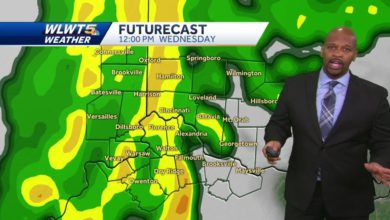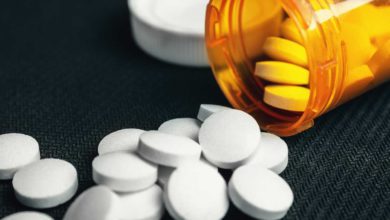
Federal officials are defending the Centers for Disease Control and Prevention's decision to cut the amount of recommended time people should isolate after testing positive for the coronavirus.
The CDC announced its recommendation to reduce the number of isolation days from 10 to five Monday. Some have rejoiced in the shortened isolation period, while others have criticized the decision, arguing the CDC turned its back on science and bowed to business interests.
The announcement came days after Delta Airline's CEO publicly asked the CDC for a shorter isolation period, and in the midst of thousands of canceled flights, which airlines have blamed on staffing shortages because of the latest surge in coronavirus infections.
CDC Director Rochelle Walensky said the new recommendation is backed by science on CNN on Wednesday. The most amount of COVID-19 transmission happens in the one or two days prior to developing symptoms and in the two to three days after developing symptoms, Walensky said – totaling five days.
The decision is backed by behavioral science, too, she said.
“It really had a lot to do with what we thought people would be able to tolerate,” Walensky told CNN's Kaitlan Collins.
A USA TODAY analysis of Johns Hopkins University data shows recorded U.S. COVID cases this month are already the third-highest of the entire pandemic, and Walensky said she expects even more cases of the highly contagious omicron variant.
The rapidly rising cases contributed to the CDC's decision to shorter the isolation period: Dr. Anthony Fauci, director of the National Institute of Allergy and Infectious Diseases, said forcing everyone who tests positive for COVID-19 to isolate for 10 days could lead to much more dangerous consequences.
“The alternative is something that no one wants: and that’s to shut down completely," he told Chris Hayes on MSNBC. "And we know that’s not going to be palatable to the American public.”
Professional associations have pushed back on the new guidelines, saying they'll be harmful to workers. The American Nurses Association urged the CDC to reconsider its decision, saying it was premature.
"This guidance is especially problematic when reliable testing is not widely available, and particularly difficult to access in places experiencing surge conditions," the association wrote in a news release.
Also in the news:
► Americans were urged by the CDC to avoid travel to Sweden and other European destinations because of high rates of COVID-19.
📈Today's numbers: The U.S. has recorded more than 53.6 million confirmed COVID-19 cases and more than 822,000 deaths, according to Johns Hopkins University data. Global totals: More than 284.6 million cases and 5.4 million deaths. More than 205 million Americans – 61.9% – are fully vaccinated, according to the CDC.
📘 What we're reading: Next month, Americans will be able to request free tests from a website, and kits will be mailed to homes. The website, and other details about how and when the tests will be distributed, have not been released. Experts urge that insurers work with pharmacies to make the tests free to consumers up front.
Keep refreshing this page for the latest news. Want more? Sign up for USA TODAY's free Coronavirus Watch newsletter to receive updates directly to your inbox and join our Facebook group.
Hospitalization numbers encouraging amid latest infections surge
Reported daily cases of COVID-19 in the U.S. have soared to their highest level on record at over 265,000 per day on average, but hospitalizations numbers are less gloomy, officials say.
New cases per day have more than doubled over the past two weeks, eclipsing the old mark of 250,000, set in mid-January, according to data from Johns Hopkins University. Authorities say the highly contagious omicron variant and indoor, holiday gatherings are fueling the surge.
Experts say early data indicates omicron might not be as severe as previous variants. That and the rise in vaccinated Americans have had an impact – the number of Americans now in the hospital with COVID-19 is running at around 60,000, or about half the number in January, the Centers for Disease Control and Prevention reported. And Dr. Anthony Fauci said the average stay during the current surge at a major South African hospital is about four days, down from 8.8 days in previous surges.
Fauci: Cancel your large New Year’s plans with ‘hugging and kissing’
Dr. Anthony Fauci, the nation’s top infectious disease expert, warned Americans to stay away from large-scale New Year’s parties and opt for small gatherings with vaccinated and boosted people.
“If you were in a situation with a family setting, in your home, with family – parents, children, grandparents – and everyone is vaccinated and boosted, although the risk is never zero in anything, the risk is low enough that we feel you should continue to go through with those plans,” Fauci said during a news briefing Wednesday.
Cities around the world have canceled their large New Year’s Eve celebrations amid the rapid spread of the omicron variant of the coronavirus. New York City put an attendance cap of 15,000 on its annual Times Square and will require proof of vaccination. Events in Los Angeles and Seattle have also been canceled.
“If your plans are to go to a 40- or 50-person New Year’s Eve party with all the bells and whistles and everybody hugging and kissing and wishing each other a Happy New Year, I would strongly recommend that this year we do not do that,” Fauci said.
Key to reopening schools: Testing
In anticipation of steep challenges reopening schools amid an omicron-driven surge of infections, districts are planning to ramp up COVID-19 testing when classes resume in January. New testing strategies come as COVID-19 infections and pediatric hospitalizations have shot up in a handful of states, especially in the Northeast. With a record number of cases, even among fully vaccinated individuals, school leaders are worried not only the health of staff and students, but also about the ability to stay open if too many employees fall prey to illness or quarantine. Read more here.
"We are moving closer to a safe reopening of school next week," Michael Mulgrew, head of the United Federation of Teachers in New York City schools, said. "But we are not there yet."
– Erin Richards
Tested positive for COVID during the holidays? Here's what to do.
Testing positive for COVID-19 starts a confusing, disruptive and at times frightening process – one that millions of Americans will likely go through in the coming week.
First, you need to isolate. That’s a more intense version of quarantining – it means cutting off contact with other people as much as possible so you reduce the chance of infecting them. This also means forgoing travel, not going to work and even limiting contact with people in your own household who aren't infected.
The CDC says isolating is a necessary step whether you’re vaccinated or unvaccinated, and whether you have symptoms or feel fine.
Everyone who tests positive for COVID-19 should monitor their symptoms. And people who are unvaccinated or at high risk for severe disease should be extra-vigilant for symptoms that might require emergency care. Call your doctor for early treatment options.
How long should you isolate? How long will I be contagious? What if you are in close contact with someone who tested positive? Here’s what you should know about omicron and COVID-19 this holiday season.










